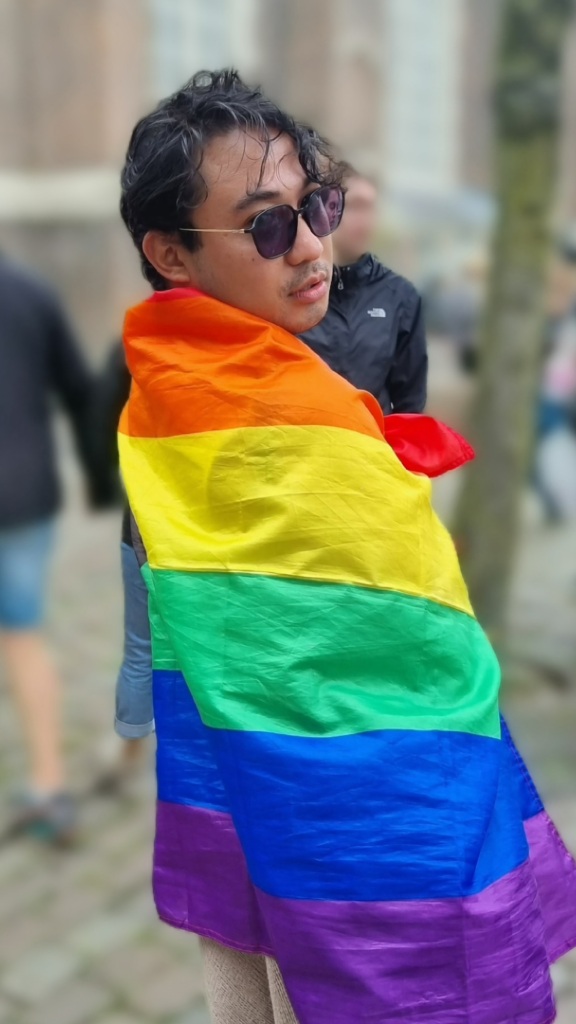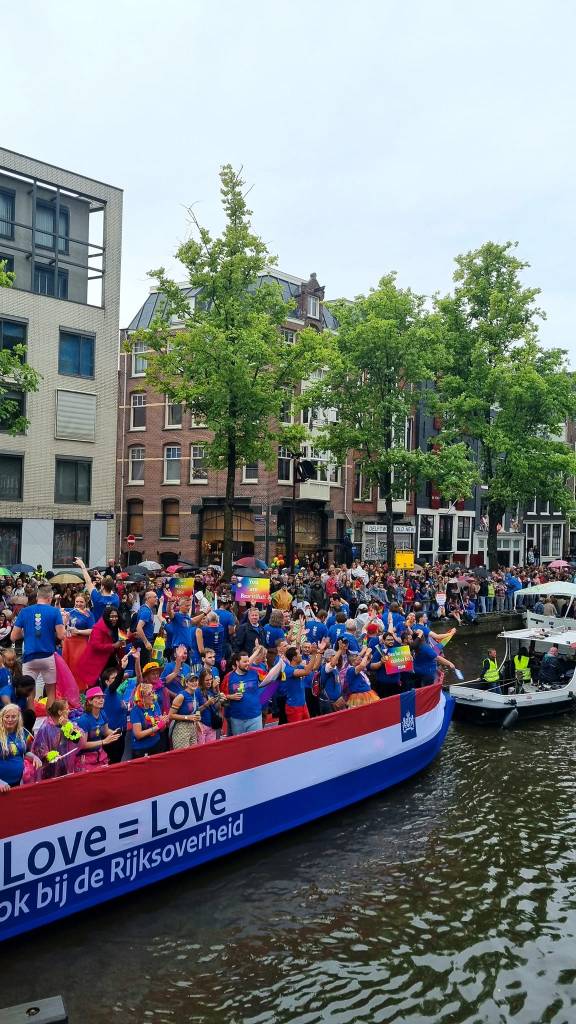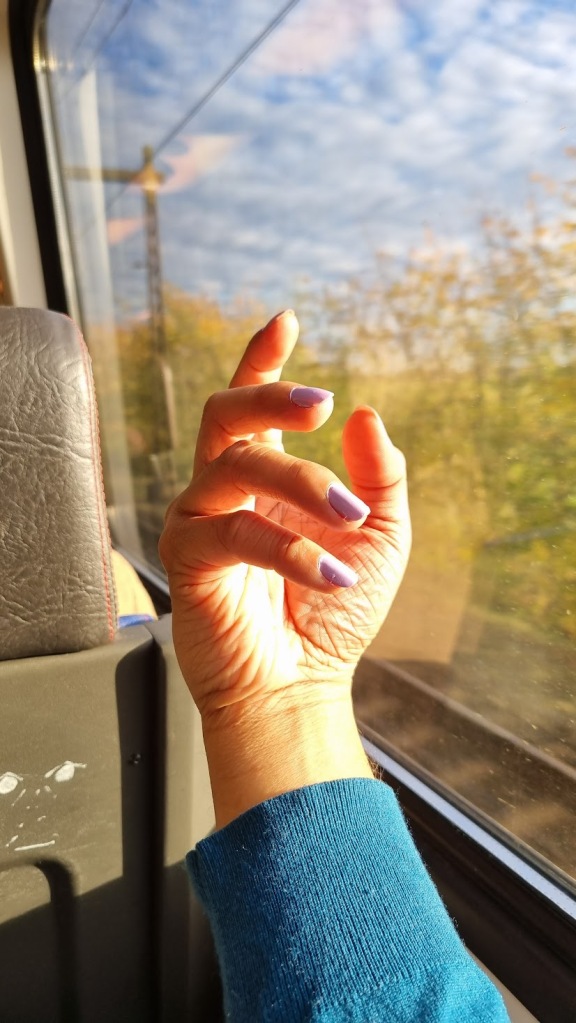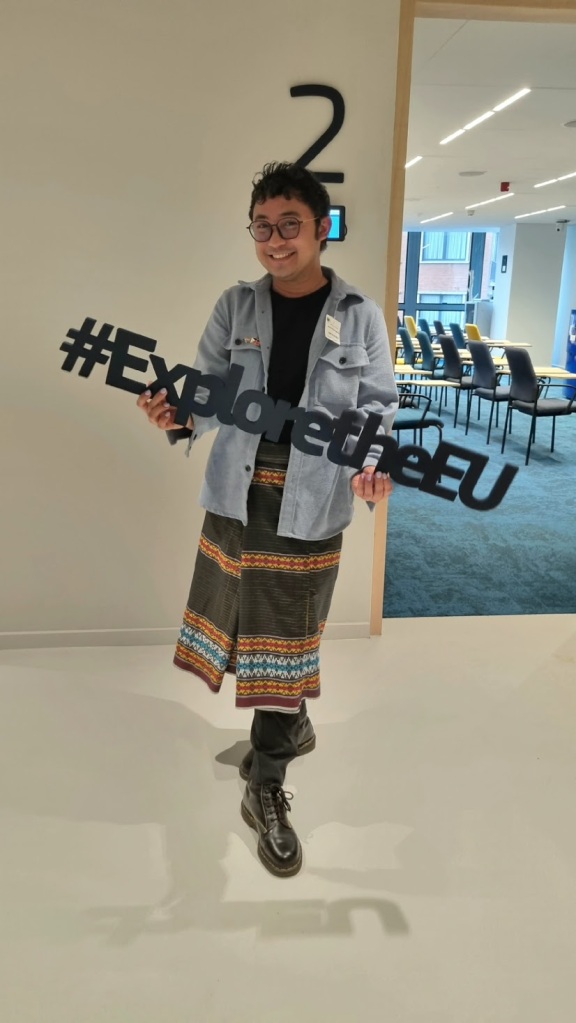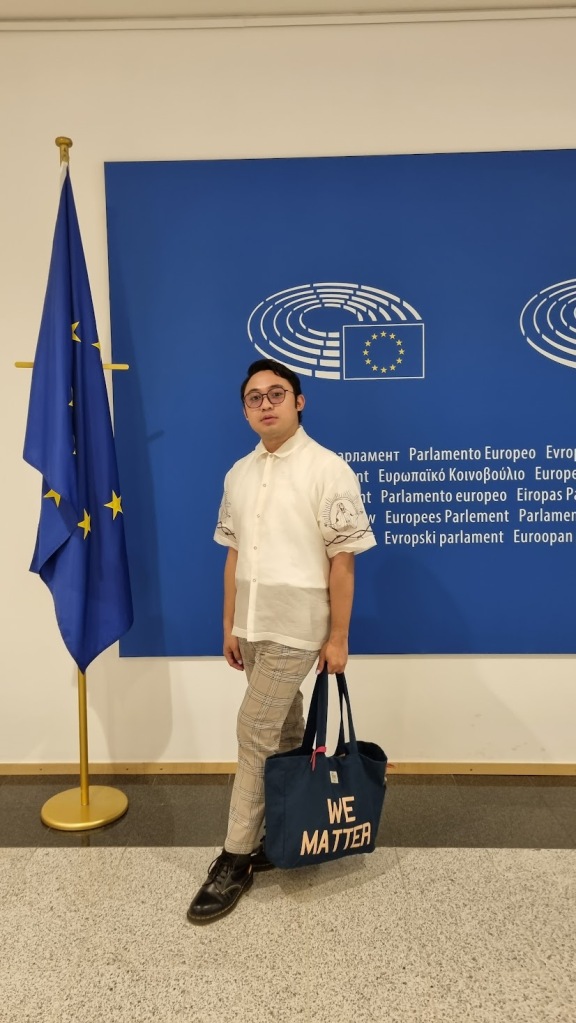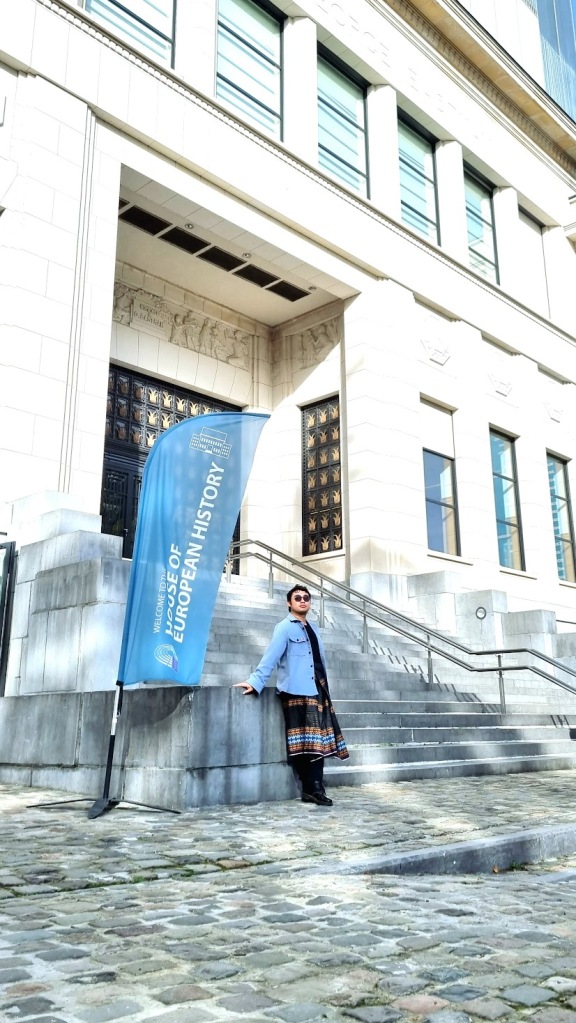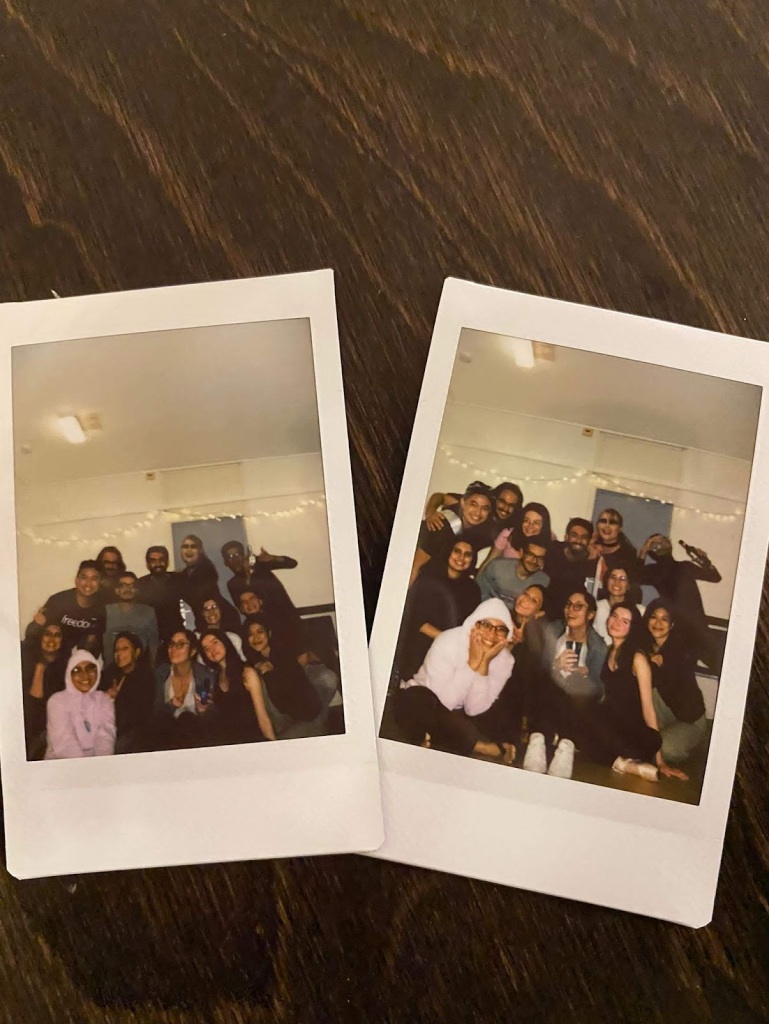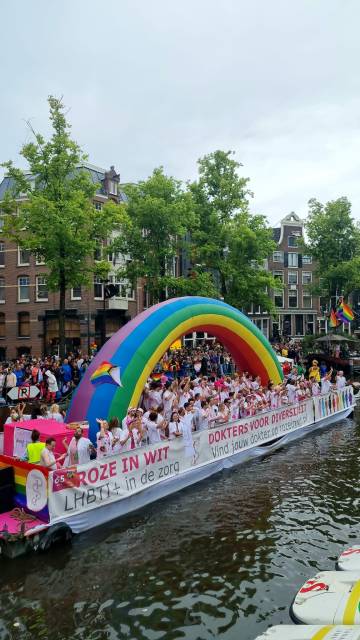by Gian Paulo Rotersos Paglinawan
Growing up, I have heard many times from the people around me that being an effeminate boy is morally wrong. They taught me that playing with dolls rather than toy guns and cars was like sinning. Looking back, I always felt more like a Barbie boy or a Miss Universe contestant, not a Spiderman or Batman wannabe. I never liked putting on a cape like the one superheroes had. When alone in our house, I wrapped table linen or blanket around my waist, used a Good Morning towel as a wig, and sashayed around the house wearing the ankle strap heels of my mother.
My parents are devout Catholics. So are my aunties, uncles, cousins, godparents, grandparents, and great-grandparents. The postcolonial Philippines remains overwhelmingly Catholic, making it the only country, apart from Vatican City, that does not legalize divorce (except for Filipino-Muslim women in Mindanao). Due to it being a predominantly Christian country, it is more tolerant than accepting of LGBTIQ+ people.
Restricted LGBTQ+ rights in the Philippines
In the Philippines, you can identify as lesbian, gay, bisexual, transgender, or Queer and express yourself however you want. Still, you cannot enjoy the same rights as cisgender heterosexual people. Many educational institutions still have gendered uniforms and haircut restrictions that discriminate against gender-diverse students. You can love whoever you want, but no holding of hands in public. You cannot get married, too. You can pursue a career in any field; however, you cannot assert your right to complete protection from any form of abuse, violence, or discrimination based on your sexual orientation, gender identity, and gender expression (SOGIE).
Consequently, when deciding where to pursue my Erasmus Mundus Master of Arts in Euroculture, I sensibly weighed my options where I could be and live authentically as a genderqueer. More so, I am a short, moreno Southeast Asian, which means I am not only visibly Queer but also racially and ethnically different. Or so I thought. I did a lot of research before selecting where to do my Erasmus+ mobility and picked three out of eight European countries in our consortium: the Netherlands, Spain, and the Czech Republic. In this essay, I will share about my journey as a Filipino genderqueer in the Netherlands.
The Netherlands: A Safe Haven for Queer People?
One could immediately guess why the Netherlands was first on my list. The northwestern European country is a bastion of equality and anti-discrimination laws in the European Union (EU) and the first country worldwide to legalize marriage for same-sex couples. Not that I plan to get married there, but to a Filipino genderqueer, it remains utopian that a society can acknowledge and protect the rights and welfare of LGBTIQ+ people. In the Philippines, our policymakers are still debating if they should pass the SOGIE Equality Law. It primarily seeks to protect the fundamental human rights of Filipinos with diverse SOGIE. This legislation that recognizes and criminalizes any form of discrimination and injustice, especially among the members of the Filipino LGBTQIA+ community, has been on the rocks since 2000, a year before the Dutch allowed same-sex couples to celebrate their right to get married.
The Netherlands is committed to promoting equal rights for LGBTIQ+ people worldwide. As a gender equality advocate and a core member of Mindanao Pride, the biggest coalition of gender equality advocates in the southern Philippines, our organization partnered with the Embassy of the Netherlands in the Philippines to organize the first Mindanao Pride Kadaiyahan Festival held in Cagayan de Oro City, Philippines. The event celebrated diversity, love, and equality but also called for a more inclusive society for the LGBTIQ+ community in the southern part of the country.
Until today, the Philippines has yet to pass an anti-discrimination law that includes the protection of the rights and welfare of Filipinos with diverse SOGIEs. Recently, the passing of the SOGIE Equality Bill has stalled again. Unfortunately, several members of the House and the Senate of the Philippines believe that this bill threatens the freedom of speech and religion, veiling their bigotry with their self-proclaimed Christian beliefs. Do not get me wrong—I also believe in God, but the God I worship does not discriminate! And what happened to the inviolable separation of the Church and the State?
Pride and Euroculture in the Netherlands
During my stay in the Netherlands, I have never received a judgment for how I expressed myself. I am an out and proud Filipino genderqueer. I want to live my life unapologetically without getting bullied or disrespected. In Groningen, my first-semester Euroculture host city, several Progress Pride flags were hanging on the balconies and hoisted outside establishments. On my first day there, I asked my newfound Dutch-Vietnamese friend to take a photo of me standing next to the rainbow-painted crossroad near the Hoofdstation while carrying a Pride-inspired tote bag we got from IKEA. Also, I was wearing my favorite gray jacket with rainbow colors on the sleeves. It already gave me the impression that I would have the queerest time in the Netherlands.
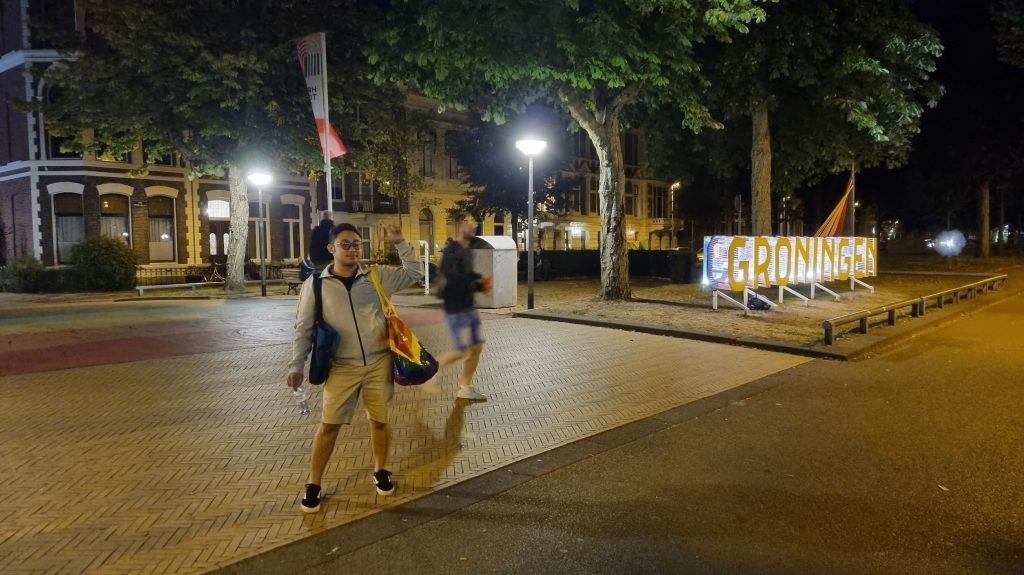
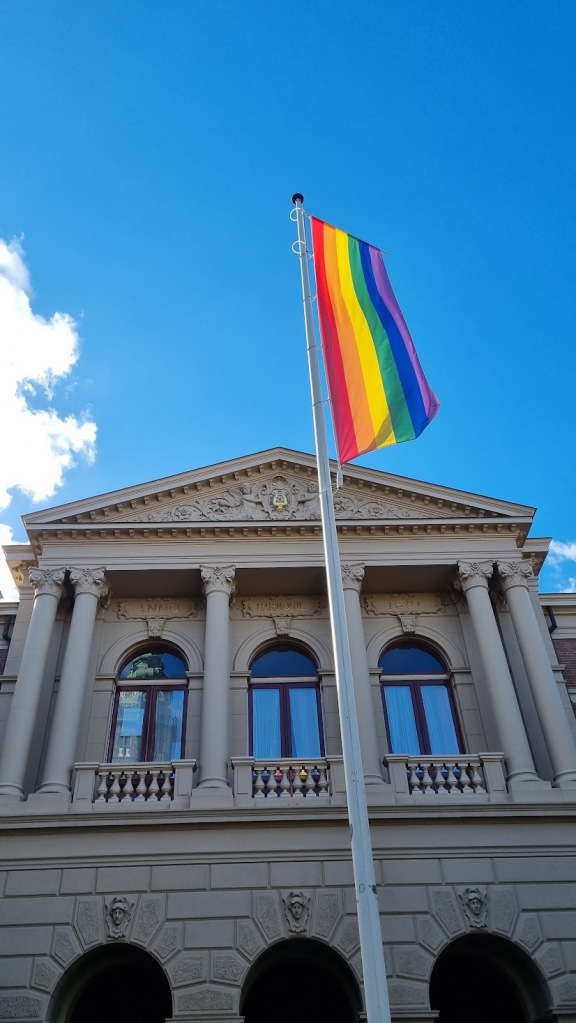
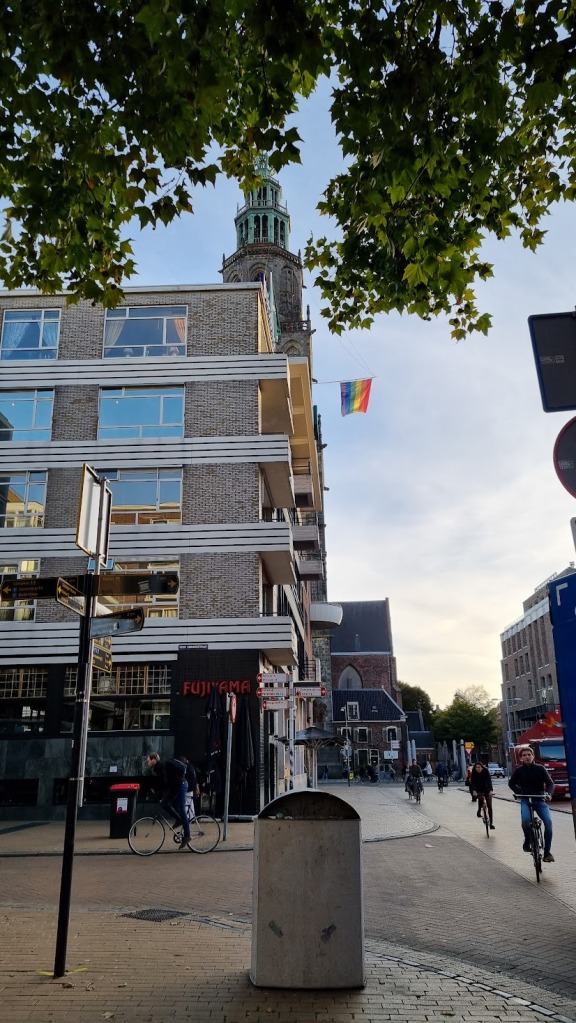
During the Euroculture orientation day, I was thrilled to see my preferred pronouns (they/them) written under my name on the handbooks that the Euroculture-Groningen course managers distributed. I already felt seen and validated in my first few days. It removed a layer of insecurity that I held for so long because many people thought I was only trying to be fancy about my preferred pronouns and gender nonconformity. I was not. Kudos to Euroculture for fostering a safe space for students with diverse SOGIEs!
As part of the Eurocompetence activities, our group in Euroculture Groningen visited Brussels in October 2023. Before we traveled, our lecturer emailed me, asking if I had any requests about the accommodation arrangement to ensure my comfort during the trip. I did not want to be treated special or differently because of my gender identity. But I was thankful he asked. I had a traumatic experience sharing a room with a man I did not know personally before. So, I requested to stay alone in my hotel room for personal reasons. A day before the trip, I painted all my nails light purple, the color of my favorite KPop (Korean Pop) Boy band. As the lone Filipino student in our cohort in Euroculture, I donned a modern white Barong on our first day during our official visits to the UNICEF European Union, the European Economic and Social Committee, and the European Parliament in Brussels. The following day, I went to the House of European History and the European Commission office wearing a skirt made from a black batik or malong from Mindanao, Philippines. I have never been prouder to represent and celebrate the diversity of my identity in social, political, and cultural spaces in Europe.
Speaking of spaces, I lived on the same floor of an old apartment building in Groningen with a diverse group of people from different parts of the world. Most were from Europe (Italy, Spain, Germany, Greece, Portugal, Switzerland, and the United Kingdom), some were from the Americas (the United States and Brazil), and the rest represented Asia (the Philippines, Indonesia, India, Pakistan, Kazakhstan, and Turkey). Despite our cultural differences, we fostered a safe and inclusive living environment for everyone. The third floor of the BNC Apartment at Plutolaan 329 was our safe space. We had one transitioning transfemme, whose Drag performances entertained us the whole semester. They truly inspired me to embrace my femininity and perform in Drag. We also had a bisexual flatmate who shared about his journey in discovering and living with his bisexuality. The level of trust and support we had for each other made me feel safe and included. We respected one another and treated each other like family.
Interactions with local Dutch Queer individuals
Moreover, the queer dating scene in Groningen was a whole new experience. I dated a few Dutch people, and one that stood out to me was the transgender guy I matched through a dating app. His medium-length wavy ginger hair and Bohemian fashion style suited his passion for music. He had a great singing voice and played the handpan drum very well. When we met, he took me to a nice bar in Grote Markt, and we shared interesting facts about ourselves and our countries. Then, he mentioned that his latest boyfriend was Filipino. What a coincidence! He also shared with me that he started transitioning from a young age with full support from his family. He held my hand as we walked to the train station. In my country, such displays often attract stares or mocking comments, especially from insecure men. They would say things like, “Ay, Barbie,” as if there is something wrong with being affectionate. In Groningen, nobody around us seemed to care or stare. Everyone minded their own business.
I also went out with a local Drag queen, who described himself as a cisgender gay man. I thought only heterosexual people could identify as cisgender. He explained that his gender now (a Queer man) aligns with the gender that the doctor assigned or his parents presumed at his birth (a boy). It was during that moment that I learned what cisgender means. According to the Trans Hub website, you are cisgender if the gender you identify with today aligns with the gender assigned to you by a doctor or presumed for you by your parent(s) at birth. Indeed, the gender of a person is different from their sexuality. Therefore, a Drag queen can be cisgender and straight (heterosexual), gay (homosexual man), lesbian (homosexual woman), bisexual, Queer, pansexual, demisexual, or another sexuality. It is the same as being transgender and having any sexuality.
SOGIE Terms and Gender-Neutral Pronouns
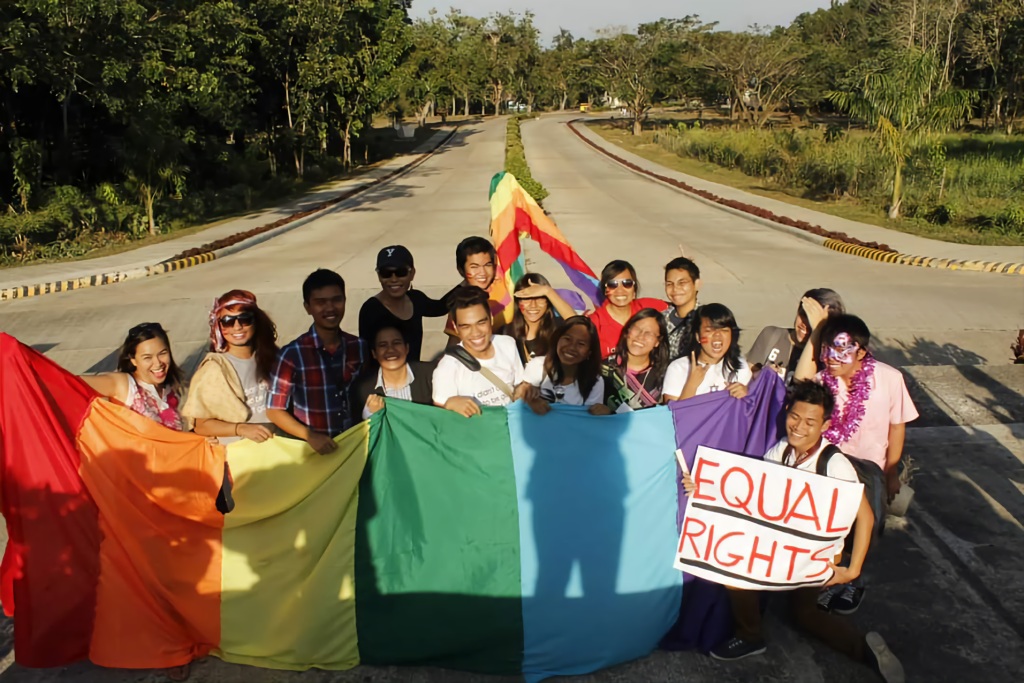
In the Philippines, we do not have separate terms for gender identity, gender expression, and sexual orientation. For example, the word baklâ (in Tagalog) or báyot (in Binisayâ) is an umbrella term that encompasses a broad spectrum of identities, including homosexuality, bisexuality, pansexuality, being transgender, gender nonconformity, and Queer identity, among others. Even the word Queer does not have a direct translation in Philippine languages.
The University of the Philippines Mindanao creative writing professor and award-winning lesbian writer, Jhoanna Lynn B. Cruz, wrote an interesting article about using the word accla as a Filipino term for Queer. I like this term better than baklâ or báyot because when I was younger, people used these words to insult my flamboyant personality. Though, today, others prefer to use such terms to reclaim their Queer identity. In most Philippine languages, we use the third-person siya, a gender-neutral pronoun, when referring to a singular person or when their gender is unknown. Hence, I like using gender-neutral they/them pronouns. I am comfortable with my masculine features and feminine qualities, but I prefer not to be called a he or a she. Also, please use Mx (pronounced mix) as my title, not a Mr or Ms.
Overall, I am satisfied and grateful for my experiences as a genderqueer Filipino international student in the Netherlands. To cap off my academic adventure in the Netherlands, I joined the Amsterdam Pride in August 2023 with my fellow Queer Filipino international scholars based in another Dutch city. Witnessing the Canal Parade for the first time was unique from all the Pride festivals I organized and attended in the Philippines and Thailand. I could see almost all genders and sexualities in the spectrum and different races and ethnicities represented in the Amsterdam Queer and Pride events. The after-party showcased impressive Drag performances from homegrown and international Drag queens. Indeed, it was the queerest Pride I have experienced thus far. It was also rainy, so it was indeed wet and wild!
A month after the Amsterdam Pride, I returned to the city to participate in the Europe Lab 2023. I was one of the selected Europe-based equality advocates for a five-day workshop, seminar, and discussion on the legacy of colonialism and its importance for contemporary society. As part of the Gender and Colonialism group, we pitched projects to promote equality and inclusion in Europe.
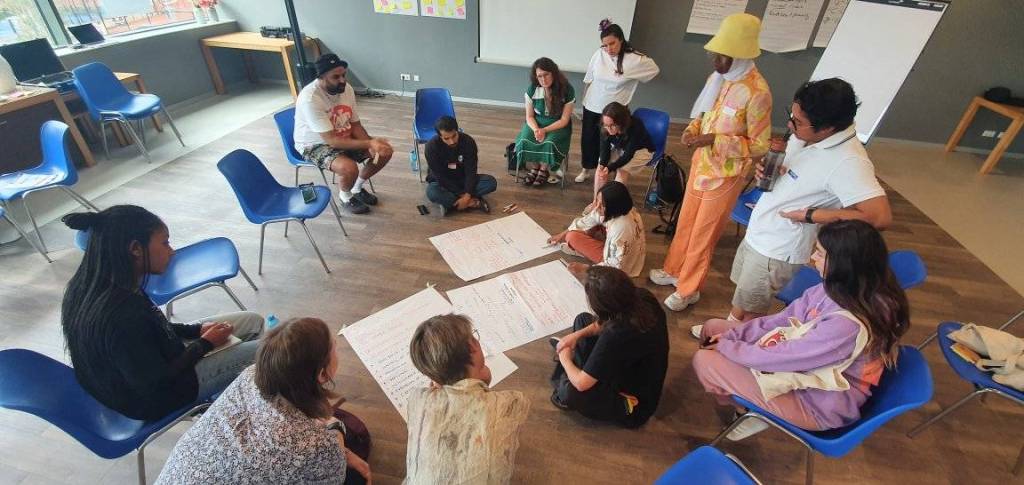
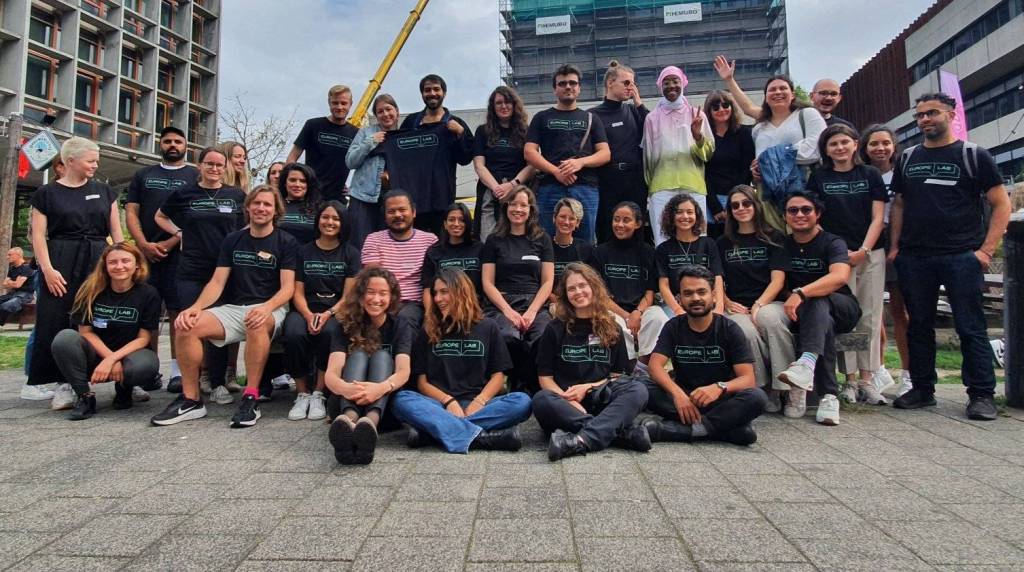
Ultimately, Pride is a Protest, and the Netherlands is at the forefront of the global movement for a more inclusive and egalitarian society. A month before the Canal Parade, the Zero Flags Project Foundation installed the Monument of Visibility at the Museumplein (Museum Square) as part of its 2023 edition of the Zero Flags Project. This project is a countdown to zero flags; 71 countries worldwide criminalize homosexuality, and in 11 of these countries, the punishment for homosexuality is death. One of them is Brunei Darrusalam, our neighbor in Southeast Asia, which initially implemented the death penalty under its anti-LGBT laws. On the other hand, Thailand, another member state of the Association of Southeast Asian Nations (ASEAN), has recently passed its marriage equality law. It is the first country in the ASEAN region and the third Asian country to pass the same-sex marriage law, a monumental win for my LGBTIQ+ friends in Thailand! I hope in the years to come, the Philippines will soon pass its marriage equality bill. But first, we need the SOGIE Equality Law.
Living as a Filipino genderqueer in the Netherlands was both a rewarding and a learning experience. I hope Filipinos can learn from the Dutch about being genuinely welcoming and accepting of people with diverse gender identities, gender expressions, and sexual orientations. True inclusivity means a more inclusive and egalitarian society for everyone, regardless of gender, sexuality, race, or ethnicity. My experience as an Erasmus Mundus scholar in the Netherlands is only among the many stories of Queer Asian students in Europe. Nevertheless, I hope it sheds light on the importance of fostering a safe and inclusive learning and living environment for international students with diverse SOGIEs.
Whatever your SOGIE is, I want you to know that you are valid. Your existence makes the world a better place. You are beautiful, inside and out. Do not be afraid to be different. Be bold. Be free. Be unapologetically you.
To my fellow acclas in the Philippines and abroad, let us continue to fight for the rights and welfare of our LGBTIQ+ fellows in the Philippines. Makibeki, ‘wag ma-shokot! (Fight, don’t be afraid!)
Happy Pride!

